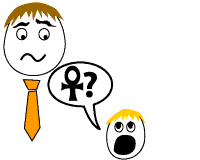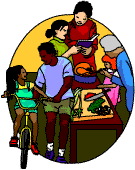Implicit Associations
Created | Updated Jan 22, 2012
Warning: The following entry contains words which some readers may find offensive. Words such as 'diversity'. Reader discretion is advised.
Implicit Associations

People on this website continue to astound me with their insights. One such person is Willem, who has been telling those of us lucky enough to be listening a lot about the history of apartheid in South Africa. Since I would never ask him to repeat all of what he's shared with us, I'll content myself with offering you all a link to an ongoing thread entitled 'Principle of a Principle'. Willem's got a great angle on some of the questions that trouble us in this postmodern world, and I think his remarks deserve a wider hearing. Stop by when you have time, and catch up on the history and analysis.
From time to time in that conversation, all of us get depressed. We ponder the issues, and then we ask ourselves, 'What can we do about it?' Good question. What can we do to make diversity work for us? (See, I told you I was going to mention stuff like that.) We go through the obvious ideas: teach tolerance (another one of 'those words'), learn to stop stereotyping people, figure out that your particular group is not the centre of the universe, and stop acting like it is, etc, etc… Pay attention to people like Mahatma Gandhi, Jesus of Nazareth, and Fred Rogers, and love your neighbour. Easier said than done, it appears from what I see every day.
One thing most of us seemed to agree on over at the 'Principles' thread was that racism is a form of mental disease. Personally, I think a lot of what's wrong with us all can be traced to the fact that we're looking at the world through a delusional lens. Some of us (naming no names, but including me) have had to deal with that problem head-on, because we know we have mental health issues. Others, who are more like their neighbours, may never have realised that all human thinking offers room for improvement. The basic assumptions are wrong.
Take the idea of 'race'. It's a completely bogus category to place human beings in. Humanity is one species, darn it. Having blue or brown eyes, dark or light skin, or a particular type of nose doesn't mean anything about your consciousness at all. Just as being born in a particular country may in some way define the repertoire of realities you may experience, but doesn't define you as a person at all. But this 'race' notion – just like the 'national character' notion – keeps getting in the way of our working together.
If you think it doesn't, stop and reflect: you probably don't talk to anyone on this website that you consider to be of a different race from you. (Whether they are, you can't say, because you can't see them.) But please consider whether you have – during, say, the last week – reacted to something someone else has said on the basis of your idea about his/her country of origin, language group, or what you believe you know about his/her religious or sexual orientation. That's hard to do, isn't it? You're pretty sure you don't do that, right? What if there was some way to find out? Ask them? You probably wouldn't believe them, anyway, and the discussion would just get out of hand. What if there were a scientific way to find out? Can you quantify racism, or sexism, or general us-vs-them-ism? Has anybody tried?
You've probably guessed that the answer is yes, or I wouldn't be taking up your time. Harvard (that's a university in the US) has a research effort called Project Implicit aimed at doing just that – quantifying and revealing unconscious, or 'implicit', attitudes. Now, how do they do that?
If you follow the link, you'll find an offer to take demonstration tests. If you go for the demonstrations, you'll be informed that:
It is well known that people don't always 'speak their minds', and it is suspected that people don't always 'know their minds'. Understanding such divergences is important to scientific psychology. – Project Implicit, introduction to IAT
Then you are invited to take part (anonymously) in Implicit Association Tests, or IATs. If you like, you can give them demographic information, as well. If you get enthusiastic, there are research projects you can help with.
The IATs themselves don't take long – and they are massively eye-opening. After a bit of practice to help your eye-hand coordination, they ask you to hit keys when you see a certain category of word or image. It's clever, this: the computer program measures how long you take to do this, and works out your associations. At the end, they'll tell you whether your conscious belief about your assumptions is matched by your unconscious reactions. They'll tell you how prejudiced you really are.
Recently, I tried a few out. I had assumed that I liked Arab Muslims slightly better than I liked some other foreigners, but the test said I had 'little or no preference' either way. That's good, I'm not unconsciously hating on Koreans, just because I had a few irritating students. Even more surprisingly, I showed 'a slight preference' for African Americans over European Americans. I hadn't expected that. Afterwards, they ask you if you think there's a reason for your results. The only thing I could think of was that for the last 15+ years, slightly more than 50% of the people I encountered on a daily basis have been black. So maybe that's who I'm used to talking to face-to-face.
Also interesting are the statistics they show you. I was dead centre on the Arab test – that is, I like a fella just as much when he's named Wahib as when he's called Ernesto. Fair enough. But 51% of those tested didn't. That's bad news. At least, becoming aware of it might help us do something about it. And I can just imagine that a black American who found that he favoured European Americans on the test (and it happens) would be shocked, and do some soul-searching, just as I questioned myself about being unconsciously prejudiced against people who look like me.
Project Implicit has been branching out. You'll notice on the welcome page that there are new demonstration tests involving mental health. (Yay!) To my surprise, I was happier than I thought I was. That was good news. It meant the vicissitudes of the rather rough week I'd had weren't completely getting me down. If you're interested in mental health questions, you might find them worth the time.

Note, too, that there are warnings on all these pages – you may not like what you see. You may find this sort of thing uncomfortable. They point out that the university researchers have an interpretation of these data that may not be accurate, because the research is ongoing. Now, that's just good, old-fashioned scientific rigour. But they add:
If you are unprepared to encounter interpretations that you might find objectionable, please do not proceed further.
That's good sense. I'm hoping some of you will be willing to take the plunge, and to tell us about it below. After all, we can complain about the problems of the world all we want, but if we aren't willing to try, how will we ever change anything? Try the mouseclicks.
Fact and Fiction by Dmitri Gheorgheni Archive
